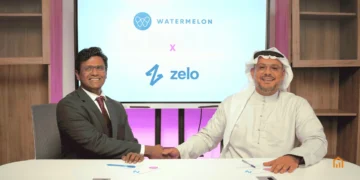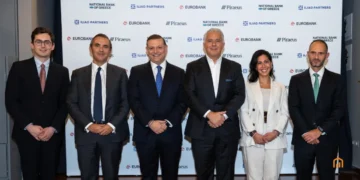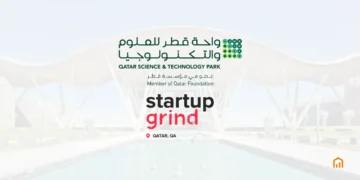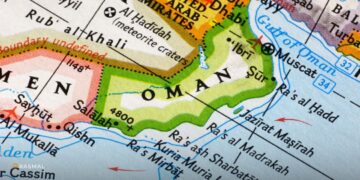Rama Kayyali, along with Lamia Tabbaa, took the first steps in the quest to improve Arabic learning for students two decades ago. The idea began in Jordan with the production of educational videos in Arabic. It then developed through online technologies. Presently, in the social media era, it has become one of the major players in educational technology aimed at Arabic.
Rasmal interviewed Rama Kayyali, CEO and co-founder of Little Thinking Minds, to learn more about the nature of this startup and the services it offers, how it has raised $3.2 million in funding since its inception, and many other questions about the startup’s successes and challenges.
MENA Startups to Watch
Let us first learn about Little Thinking Minds and why it was established?
Rama Kayyali and Lamia Tabbaa co-founded Little Thinking Minds, an EdTech company. They focus on closing education gaps in the MENA region by creating subscription-based platforms that improve Arabic literacy and learning outcomes. Based on their own pain as parents, they first started the company as they struggled to find engaging Arabic resources for their own toddlers. However, as they dug deeper, they realised there was a much bigger problem across the region.
The World Bank reports that poverty affects learning for 59% of students in the Arab world. COVID-19 worsened the situation, with studies showing that 40% of Arab kids did not benefit from online education.
There are several reasons for poor Arabic outcomes. For one thing, there are 22 accents in the Arab world and only 60% overlap between spoken and written Arabic. Curriculums are outdated and depend on memorization. Additionally, there is a lack of modern, engaging, and interactive solutions.
Furthermore, education is becoming increasingly reliant entirely on English as the language of business, technology, and science. In most private schools, mathematics, science, and social studies are taught in foreign languages. This presents a significant challenge to learning sound Arabic, which has become just another subject to learn and not the primary language of institutions.
Arabic language teachers, on the other hand, are marginalised and have little access to engaging content. Often, they are searching the web or creating their own worksheets and resources to share with their students. At the same time, many need further professional development to improve their teaching skills and bring them up to date with modern teaching techniques.
Rama and Lamia saw an opportunity to use their skills in video production and content creation. From there, Little Thinking Minds Company was born, a company focused on creating Arabic learning journeys with thousands of educationally engaging interactive resources to improve Arabic literacy and learning outcomes.
How did the concept of Little Thinking Minds platforms emerge, and when was it implemented?
A child who does not master the mother tongue by grade 4 is more likely to drop out of school, and a child who reads by grade 4 becomes a lifelong learner. We try to bring Arab children closer to their language in a way that suits today’s nature and lifestyle. At first, we were focused on GCC countries, especially the UAE, due to the high number of expats living there, the very high number of international schools, and the very weak student attainment in Arabic. But now we have expanded to other Arab countries, including Egypt and Iraq.
One of the problems we noticed is that many parents prefer to speak to their children in English. We thought this was limited to the UAE or even the GCC countries, but we saw that this problem is widespread across the region.
The weak Arabic language attainment has made governments and ministries of education in Arab countries aware that there is an entire generation that is not proficient in its mother tongue, implying a significant stumbling block in the advanced stages of education. We are attempting to address this problem by developing interactive educational platforms in Arabic.
Little Thinking Minds’ platforms have a strong presence and influence in various Arab nations; how did this happen?
Little Thinking Minds began nearly two decades ago, in 2004 when Lamia and I were very frustrated by the lack of engaging Arabic content for our sons. We started creating engaging videos that tackled preschool basics in Arabic. We were initially targeting parents as a B2C company. Although we knew we were solving a problem, we felt we had a product-market fit. In 2014, we pivoted, changed our direction, and started creating Arabic literacy platforms for schools. In the interim, we had gone through multiple rounds of funding from angel investors.
In 2018, we raised our pre-Series A from Algebra Ventures from Egypt, Innovative Startups and SMEs Fund (ISSF) from Jordan, Alturki Ventures from Saudi Arabia, and Mindshift Capital from the UAE. Since then, we have managed to scale, and today we reach over 800 schools in 10 Arab countries, including Saudi Arabia, the UAE, Qatar, Saudi Arabia, and Egypt. Our educational services cover private schools, government schools, and the refugee sector through working with non-governmental organizations such as UNICEF and USAID.
What are the most well-known services offered by Little Thinking Minds?
Little Thinking Minds Company offers a variety of services, including educational platforms such as “I READ ARABIC,” which provides Arabic reading and learning content for Arabic speakers, and “I START ARABIC,” which offers content to help non-Arabic speakers acquire Arabic reading and writing skills. We recently launched a new platform called “Benchmark Assessment“, which is an innovative platform that is personalized and adapted to each student’s interests and level of education and knowledge.
Little Thinking Minds also provides a professional training platform for teachers. It offers courses that assist Arabic language teachers in employing educational technology in the classroom, developing their tools through hybrid learning, and making lessons attractive, engaging, and interactive. These courses focus on the mechanisms of planning Arabic language lessons by addressing the skills that a twenty-first-century teacher should have in compliance with global standards.
Little Thinking Minds’ services are not limited to educational platforms; we also have impact and community initiatives focused on the education of refugees and those displaced as a result of conflicts and wars. We have also worked with UNICEF in 100 public schools that welcome Syrian refugees to provide unique content for children that addresses their psychological challenges and difficulties as students. We produced books and content based on emotional intelligence and social emotions to teach important values such as acceptance, tolerance, and empathy to alleviate this problem.
In light of the intense competition for e-learning platforms that rely on educational technology, how can Little Thinking Minds survive and expand in the MENA region?
Indeed, the number of educational platforms in the Arab world is growing significantly. However, our platform remains superior for several reasons. The first reason is that our platforms are not enrichment platforms. Instead, they are highly compatible with the curriculum. We study and research the curricula of Arab countries and harmonize the existing educational or ministerial curriculum of books, videos, or tests with the knowledge and academic outputs we provide.
Second, we collaborate with leading Arab publishing houses in culture and education. We now have more than 24 publishing houses from various Arab countries that vary in their specialization. We work with them to publish their books and educational content, as our platform aims to integrate Arab children with their peers from various surrounding countries through exposure to the cultures and understanding of other Arab countries.
Third, Little Thinking Minds is one of the most widely used and accessible platforms in the Arab world. With 500 private schools and 300 public schools currently using our various platforms, we are ahead of our competition in terms of accessibility and expansion.
Fourth, it is the diversity of our platforms and training services. We provide content for Arabic speakers. We have another feature for non-Arabic speakers. Additionally, we produce content for the KG stage and standardized tests. Moreover, we offer academic and vocational training courses. All of these services are combined on one platform. This platform provides integrated educational services for young learners.
Our platforms stand out due to the size and experience of our extensive customer support team, which is located in all branches of our offices in Cairo, Dubai, and Riyadh, as well as the headquarters in Jordan. This team provides teachers with all the technical support they need, ensuring that Arabic language teachers are in constant communication with us to resolve any issues they may face.
Additionally, we offer scientific studies on the effectiveness of our platform in the language-learning process of Arabic. One of these studies was conducted in collaboration with USAID in some public schools. Its purpose was to measure the impact of the content we provide on reducing reading difficulties and improving learning outcomes, even in poverty-stricken areas. The study demonstrated our success, further distinguishing us from our competitors.
You mentioned Little Thinking Minds getting massive funding; what aspects contributed to your success as a pioneer in educational technology in attracting so much investment and funding?
From a purely business perspective, we find that the educational technology market in the Arab world is vast and suffers from poor Arabic language content. Governments and schools have become aware of this and created a need to fill it. Looking closely, we find that the number of learners between the KG stage and the twelfth grade is about 100 million. There is an urgent need to improve the level of learning of the Arabic language. Arab countries have unanimously agreed to use tests for fourth- and eighth-grade students to measure their literacy. The decline in rates and percentages at the global level is evident. Governments and educational institutions concerned have sufficient awareness of the importance of pushing subsidized institutions to help advance these indicators to higher grades. Inaction on such an issue has severe consequences for politics, the economy, and society.
The interest in the Arabic language has become an essential issue for all countries in the region, providing opportunities for innovative entrepreneurs in educational technology to push their ideas to bridge this knowledge gap. Little Thinking Minds was one of the leading institutions that carried out its role and completed its duties to the fullest, attracting the interest of investors.
Outside of the Arab world, there are opportunities in African and Asian countries interested in teaching Arabic because they are Muslim countries that read the Holy Quran, as well as Arab communities in the diaspora. These markets make educational technology companies focusing on the Arabic language a target for investors. However, it is important for these companies to first establish themselves, demonstrate their capabilities and potential, and understand the target market. We are an example of this, as we have successfully raised funding of $3.2 million since our establishment.
How do Little Thinking Minds educational platforms target the child’s mentality, which is a challenging type of target audience to reach?
Little Thinking Minds has a large, productive team that monitors the child’s behavior and collects data and information on behavior patterns, interests, and learning methods. We use this data in learning methods that may differ from one child to the next. Some children are drawn to texts, others to images, and some to sound, videos, and movement. We direct the content according to the nature and patterns of children’s behavior.
We also value the opinions of schools, teachers, and parents to identify effective mechanisms for motivating students. Furthermore, we do not overlook the aspect of entertainment and fun by implementing a gamified learning journey that includes earning motivational points to unlock levels in educational and informative games. We continuously work on updating this content to ensure its ongoing appeal to a child’s mindset.
What are the primary issues confronting Arab e-learning platforms at a time when metaverses, artificial intelligence, and machine learning technologies have considerably increased their dominance in the online world?
In my opinion, these modern technological tools will help us increase the amount of knowledge and educational content in less time. They will also assist us in customizing the content according to each student’s learning style and knowledge. This will ultimately lead to more accurate and enjoyable educational outcomes for children. Currently, at Little Thinking Minds, we are working on ways to employ artificial intelligence and machine learning in order to improve academic results and content.
Regarding the most prominent challenges, despite the significant progress we are witnessing in technology, Some Arab schools still suffer from a lack of basic tools such as computers, tablets, and the Internet. This represents an impediment and causes great reliance on parents to complete homework. This reliance may lead to a failure to reach the educational lesson’s objectives properly. Another challenge lies in the need to re-educate the educational system and parents about the importance of the Arabic language and its role in acquiring knowledge effectively, especially in the face of the pressures of foreign language subjects and curricula. This requires the collaboration of educational institutions, schools, and parents. The third challenge, in my opinion,is the abundance of platforms available, which makes it difficult to choose among them. This can lead to confusion among schools and teachers, making the selection process challenging and overwhelming.
What, in your opinion, is the secret to Little Thinking Minds’ success that you would recommend to young entrepreneurs in the educational technology sector?
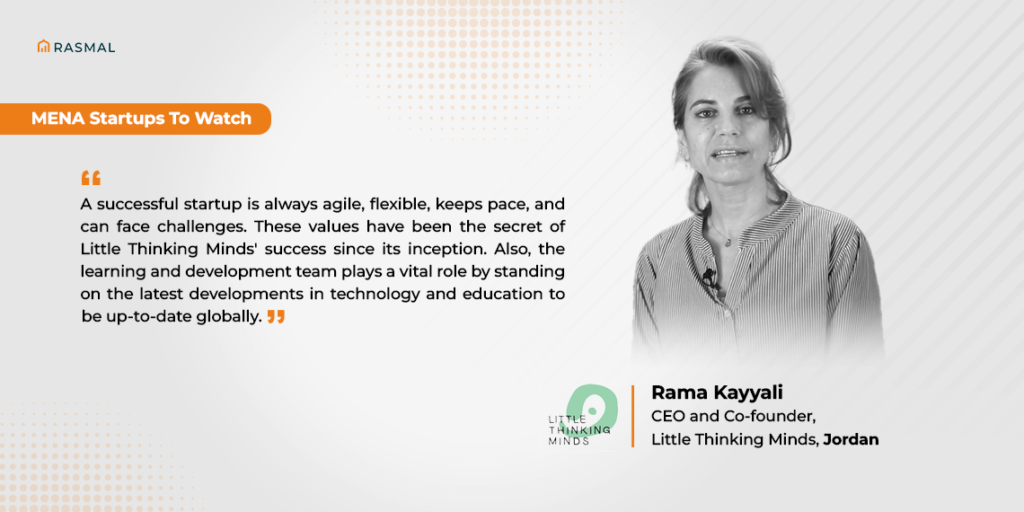
A successful startup is always agile, flexible, keeps pace, and can face challenges. These values have been the secret of Little Thinking Minds’ success since its inception, as we realized from the beginning of our film production and YouTube content publishing days that we were addressing a common problem that needed to be solved. Our first transformation was when we were able to change the marketing methodology from B2C to B2B, and now we are in the process of becoming a B2G company. Additionally, the training and development team plays a vital role. They keep up with the latest developments in technology and education. This helps us ensure that we stay globally relevant. We reflect the values of flexibility and agility in transformation and growth.
Understanding the pain points and responding to find solutions is one of the key factors for the success of any startup project. A strong understanding of the market and conducting scientific studies allow the company to achieve its goals effectively. We have accomplished this by maintaining close and direct communication with stakeholders in the education system, including schools, teachers, parents, and students, in order to meet all needs and solve any issues to enhance the user experience of our services and platforms. We have always remained closely connected to our customers. Finally, it can be said that behind every success, there is always a cohesive team. Even if you have the best platform but lack a supportive team, you will face significant challenges that may lead to the actual failure of the company.
What are your plans for future strategic expansion?
We are expanding, as we recently entered the Saudi and Iraqi markets, and we hope to spread more in public schools. We are also working to strengthen our presence by providing other educational products based on the needs of schools, as we did when we introduced the beta version of the platform (Benchmark Assessment). As I have previously stated, we also focus on developing personalized content to suit every child’s interests and educational level using machine learning and artificial intelligence.
Follow us on Instagram, LinkedIn, and Twitter for startup & business news and inspiring stories of MENA businesses, entrepreneurs, startups, innovators, investors, and change-makers.
To report any issue or error in the story, please email us editor [at] rasmal [dot] com.
Last Updated on September 23, 2023 by Safiya K


